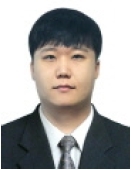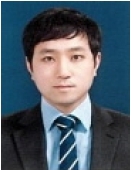
티타늄 합금의 평엔드밀 가공 시 공구 방향에 따른 가공성 평가
Abstract
Titanium alloys are classified as difficult-to-cut materials with poor machinability, leading to a continuous demand for the development of machining methods. For machining titanium alloys, various tool orientations can be employed based on the shape of the workpiece, such as the presence of an inclination angle. In this study, machining tests considering tool orientation were performed using a solid carbide end mill tool. The tool orientation was classified into three categories with inclination angles of 90° (Reference ), 45° (Upward), and 135° (Downward). The machining tests indicated that the Reference orientation exhibits the longest tool life and best surface roughness. Conversely, the Upward orientation exhibited the shortest tool life, while the Downward orientation exhibited the poorest surface roughness. When considering the Upward and Downward cases, the contact length between the cutting edge and the material becomes longer due to the inclination angle during machining, which in turn affects cutting performance.
Keywords:
Tool orientation, Cutting force, Tool wear, Surface roughness, Titanium alloyAcknowledgments
이 연구는 .한국생산기술연구원 기관주요사업 “현장설비 부착형 극저온 통합가공시스템 개발(4/4) (kitech EH-23-0011)”의 지원으로 수행한 연구입니다.
References
-
Bibeye Jahaziel, R., Krishnaraj, V., Geetha Priyadarshini, B., 2022, Investigation on Influence of Micro-textured Tool in Machining of Ti-6Al-4V Alloy, J. Mech. Sci. Technol., 36:4 1987-1995.
[https://doi.org/10.1007/s12206-022-0334-0]

-
Ha, S. J., Lim, D. W., Kim, J. H., Park, J. Y., Song, K. H., 2021, Economic Evaluation and Machining Performance in Ti-6Al-4V Titanium Alloy Milling by Integrated CO2 & MQL Injection System, J. Mech. Sci. Technol., 35:9 4135-4142.
[https://doi.org/10.1007/s12206-021-0825-4]

-
Lee, J. H., Kim, H. Y., Yoon, H. S., 2019, Sustainability Analysis in Titanium Alloy Machining, J. Korean Soc. Manuf. Proc. Eng., 18:12 73-81.
[https://doi.org/10.14775/ksmpe.2019.18.12.073]

-
Sadik, M. I., Isakson, S., Malakizadi, A., Nyborg, L., 2016, Influence of Coolant Flow Rate on Tool Life and Wear Development in Cryogenic and Wet Milling of Ti-6Al-4V, Procedia CIRP, 46 91-94.
[https://doi.org/10.1016/j.procir.2016.02.014]

- Serra, D., 2008, Superplastic Forming Applications on Aero Engines, A review of ITP Manufacturing Processes, In EuroSPF08, 1-10.
-
Möhring, H. C., Wiederkehr, P., 2016, Intelligent Fixtures for High Performance Machining, Procedia CIRP, 46 383-390.
[https://doi.org/10.1016/j.procir.2016.04.042]

-
Koo, J. Y., Kim, D. G., Kang, I. S., Jung, Y. C., Kim, Y. H., 2020, Effect of Entering Angle on Notch Wear of Insert in the Turning Process of Inconel 718, J. Korean Soc. Manuf. Tech. Eng., 29:6 489-496.
[https://doi.org/10.7735/ksmte.2020.29.6.489]

-
Thomas, M., Murray, S., Furrer, D., 2010, Introducing New Materials into Aero Engines‐Risks and Rewards, A Users Perspective, Superalloy 718 and Derivatives, 3-11.
[https://doi.org/10.1002/9781118495223.ch1]

-
M'Saoubi, R., Axinte, D., Soo, S. L., Nobel, C., Attia, H., Kappmeyer, G., Serafettin, E., Sim, W. M., 2015, High Performance Cutting of Advanced Aerospace Alloys and Composite Materials, CIRP Annals, 64:2 557-580.
[https://doi.org/10.1016/j.cirp.2015.05.002]

-
Fu, Y., Gao, H., Wang, X., Guo, D., 2017, Machining the Integral Impeller and Blisk of Aero-engines: A Review of Surface Finishing and Strengthening Technologies, Chinese J. Mech. Eng., 30:3 528-543.
[https://doi.org/10.1007/s10033-017-0123-3]

-
Zhu, L., Liu, B., Wang, X., Xu, Z., 2016, Research on Cutting Force of Turn-milling based on Thin-walled blade, Adv. Mater. Sci. Eng., 2016 2638261.
[https://doi.org/10.1155/2016/2638261]

-
Ng, E. G., Lee, D. W., Dewes, R. C., Aspinwall, D. K., 2000, Experimental Evaluation of Cutter Orientation When Ball Nose End Milling Inconel 718™, J. Manuf. Process., 2:2 108-115.
[https://doi.org/10.1016/S1526-6125(00)70018-1]

-
Yun, I. W., Hwang, J. D., 2020, Surface Quality Improvements on the Spherical Shaped Mold using Ball End Milling, J. Korean Soc. Manuf. Proc. Eng., 19:3 71-76.
[https://doi.org/10.14775/ksmpe.2020.19.03.071]

-
Yao, C., Tan, L., Yang, P., Zhang, D., 2018, Effects of Tool Orientation and Surface Curvature on Surface Integrity in Ball End Milling of TC17, Int. J. Adv. Manuf. Technol., 94 1699-1710.
[https://doi.org/10.1007/s00170-017-0523-7]

-
Schulz, H., Hock, St., 1995, High-speed Milling of Dies and Moulds-Cutting Conditions and Technology, CIRP Annals, 44:1 35-38.
[https://doi.org/10.1016/S0007-8506(07)62270-7]

-
Chu, C. N., Kim, S. Y., Lee, J. M., Kim, B. H., 1997, Feed-rate Optimization of Ball End Milling Considering Local Shape Features, CIRP Annals, 46:1 433-436.
[https://doi.org/10.1016/S0007-8506(07)60859-2]

-
Fard, M. J. B., Bordatchev, E. V., 2013, Experimental Study of the Effect of Tool Orientation in Five-axis Micro-milling of Brass using Ball-end Mills, Int. J. Adv. Manuf. Technol., 67 1079-1089.
[https://doi.org/10.1007/s00170-012-4549-6]

- ISO, 1989, Tool Life Testing in Milling — Part 2: End Milling, ISO 8688-2:1989, Geneva.
-
Kepczak, N., Zgorniak, P., Lajmert, P., Rosik, R., Sikora, M., 2020, Influence of Machining Parameters on the Polymer Concrete Milling Process, Int. J. Adv. Manuf. Technol., 106:7 3017-3032.
[https://doi.org/10.1007/s00170-019-04811-x]

-
O’Hara, J., Fang, F., 2019, Advances in Micro Cutting Tool Design and Fabrication, Int. J. Extreme Manuf., 1 032003.
[https://doi.org/10.1088/2631-7990/ab3e7f]


Ph.D. Student in the Precision Mechanical Process and Control R&D Group, Dongnam Division, Korea Institute of Industrial Technology. His research interest is Machining Process.
E-mail: msparker8@kitech.re.kr

Senior Researcher in the Precision Mechanical Process and Control R&D Group, Dongnam Division, Korea Institute of Industrial Technology. His research interest is Machine Tool Metrology.
E-mail: hhlee84@kitech.re.kr

Researcher in the Precision Mechanical Process and Control R&D Group, Dongnam Division, Korea Institute of Industrial Technology. His research interest is Machining Process.
E-mail: whyun@kitech.re.kr

Senior Researcher in the Precision Mechanical Process and Control R&D Group, Dongnam Division, Korea Institute of Industrial Technology. His research interest is Process Monitoring.
E-mail: mrkim@kitech.re.kr